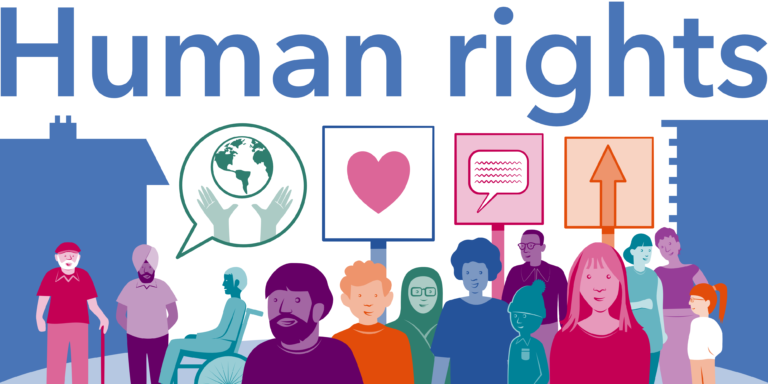New tools to help improve rights-based policy and practice
- Area of Work: Policy and Research, Resource
- Type: News Item
- Published: 9th September 2025

The resources come from a partnership between the ALLIANCE, Public Health Scotland, and the University of Strathclyde.
Since 2015, the ALLIANCE, Public Health Scotland, and the University of Strathclyde have worked together as the Health and Human Rights Partnership (HHRP), an exemplar collaboration that seeks to promote participation and co-production in health and human rights, including peer research.
This year, we have worked together on three new pieces work, all designed to help tackle health inequalities and improve rights-based policy and practice, particularly in health, public health, and social care.
The three resources published today are:
Commissioning Peer Research to Support Human Rights in Practice: Guidance for Duty Bearers
This has been developed to support duty bearers to use existing peer research in their decision-making, and to guide them through the process of commissioning new peer research. The guidance can be read as a whole, or by relevant sections. It provides:
- General information about peer research, how it connects to human rights and duty bearers.
- A summary of three completed peer research projects, their findings, recommendations, and key emergent themes to inform action.
- Practical checklists to support the design, delivery and commissioning of peer research.
We would encourage all bodies providing public services to undertake peer research, and use this guidance to help inform decision-making and promote rights.
Access the peer research guidance
Exploring the alignment of public health and human rights legal duties in Scotland
This briefing paper is intended to inform implementation planning for the Scottish Human Rights Bill. It provides an example of mapping areas of alignment, and potential divergence, between existing public health duties and the proposed legal duties under the Bill as these duties are currently understood.
The paper is designed for senior leaders in public health and health and social care in Scotland. It can support strategic decision making by helping leaders identify where existing duties may already align with proposed human rights obligations, and where further action – like policy review, training or the development of implementation tools – may be needed to prepare for the Scottish Human Rights Bill.
Health and human rights: Rights-based decision-making in healthcare settings
Delivering an action in SNAP 2 (Scotland’s second National Human Rights Action Plan), this preliminary mapping exercise identifies real world examples of rights-based decision making in healthcare settings.
It also contains a Rights Based Decision Making Flowchart (and guidance), which demonstrates how a human rights-based approach to decision making can be implemented in practice. This new tool is designed to help decision makers consider how policies or decisions can positively promote rights, not just limit them. It can be used in conjunction with Integrated Impact Assessments (IIA) and Equality and Human Rights Impact Assessments (EQHRIA) as part of a wider approach to mainstreaming.
Read the mapping report and access the flowchart toolkit
End of page.
You may also like:
Share your views before 19 February
Continue readingReform of the council tax system is long overdue, with the current system negatively impacting funding for services including social care.
Continue readingFirst monitoring report shows improvements in wellbeing and services alongside ongoing gaps in data and unequal outcomes
Continue readingProgress in many areas is welcome, but the budget must go further on social care, mental health and third sector support.
Continue readingThe 'joint statement on prevention' partners have issued a follow-up ahead of the 2026-27 Scottish Budget.
Continue readingEvent calls for human rights to be a priority ahead of the Scottish Parliament Elections in 2026.
Continue readingCommission raises concerns over the state of economic, social and cultural rights in Scotland
Continue readingNew online platform invites individuals and communities to shape Scotland’s path to net zero
Continue readingA survey of ALLIANCE third sector members found a worsening financial crisis arising from a range of pressures.
Continue readingThe ALLIANCE has produced a briefing for the Scottish Parliament debate on BSL, taking place on 11 December 2025.
Continue readingScottish Government outline actions in response to economic, social and cultural rights observations
The plan comes in response to the Concluding Observations from the UN Committee on Economic, Social and Cultural Rights earlier this year.
Continue readingThe ALLIANCE urges stronger social care integration, a clearer prevention focus and digital inclusion at the heart of NHS Delivery proposals
Continue readingNearly half of unpaid carers cut back on essentials as financial and health pressures intensify
Continue readingNew report warns thousands spending their final months in financial hardship and fuel poverty
Continue readingIndependent expert panel review recommends major changes to align abortion law with modern clinical practice
Continue readingALLIANCE and Engender call for an intersectional and rights-based approach to underpin a national investigation into maternity services.
Continue readingThe response welcomes ambition of draft standards but identifies key gaps in inclusion and communication
Continue readingThe Civil Society Working Group on Incorporation - of which the ALLIANCE is a member - has three main asks.
Continue readingMost respondents supported the principle of a balance between cross-cutting and condition-specific work.
Continue readingAny extension of Freedom of Information duties directly to the third sector must account for resource and capacity.
Continue readingThe Scottish Government are aiming for a single framework alongside time-limited action plans that can be condition-specific where required.
Continue readingNow is the time for a full-throated defence of the ECHR and HRA. No one has human rights, unless we all have human rights.
Continue readingHave your say in the draft 'Quality prescribing for Chronic Pain: a guide for improvement 2026-2029'.
Continue reading70% of disabled women reported feeling worse off financially compared to last year.
Continue readingA partnership of organisations including the ALLIANCE have issued an open statement on what's needed to urgently tackle health inequalities.
Continue reading